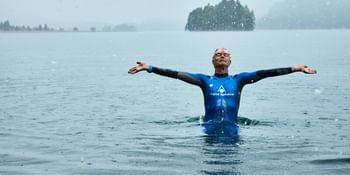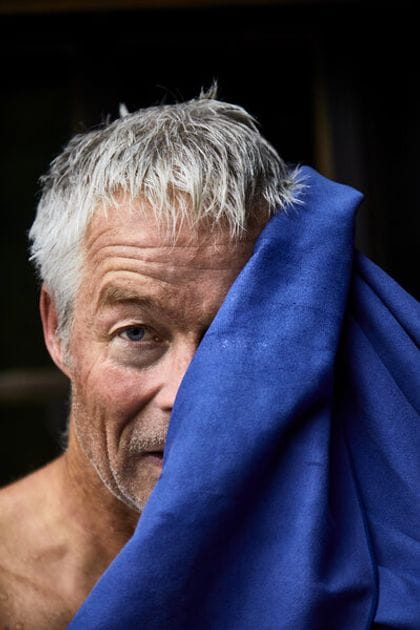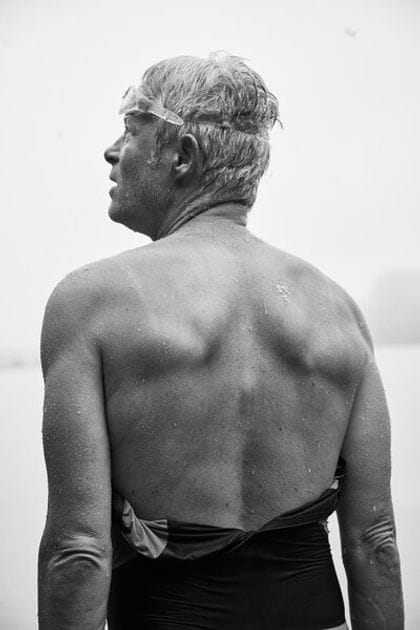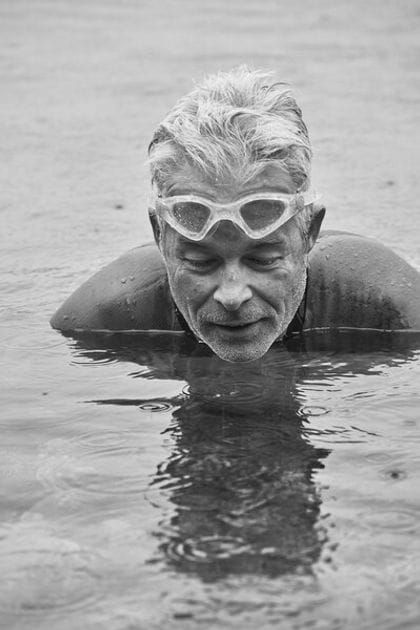The future is blue
Water ambassador Ernst Bromeis has been raising awareness for sustainable water management for nearly 15 years. Sustainability, to him, isn‘t just an environmental topic; it is as much a socioeconomic issue. Water isn‘t just a resource; it is the source of all things living.
«Today, I don‘t get as many headshakes as I used to,» says Ernst Bromeis with a smile, recalling his first year as a water ambassador. He had just quit his career as a professional athletes‘ coach and created quite a sensation by swimming across 200 lakes in the Canton of Grisons. «I would reason that we need to use water responsibly as all our lives rely on it. But, back then, not many people paid heed. In their minds, the issue couldn‘t be that pressing in Europe‘s water reservoir.»

They were mistaken. Last winter, we had very little snow. Come spring, the Alpine lakes lacked snowmelt. Add to that an uncommonly hot and dry summer, and we get a drought on an unprecedented scale – just next door. The river Po, on which most of Northern Italy‘s agriculture relies for water, all but dried up. To get sufficient water for their fields and livestock, Italian farmers demanded that the water levels of the Lago di Garda and the Lago Maggiore in the southern Alps be lowered. Lakeside communities feared for the summer tourist season, and, further up the mountains, the hydropower companies, with next winter‘s electricity consumption in mind, did not want to relinquish any water either. The heated debate spilt over into Switzerland, where many rivers originate that feed the Po.

«The controversies we witnessed last summer are a foretaste of what is to come,» comments Bromeis. We used to think of water- related issues as existential threats only in far-away countries – say, floods in Bangladesh or droughts in Africa. «We now witness a water crisis in the Alps even though no one is suffering from thirst.» Last summer‘ s problems made clear how closely interconnected we are by water – water connects all countries, industries and people from all walks of life across Europe. «Water knows no boundaries. It affects all of us.»

Ernst Bromeis‘s preoccupations don‘t end with environmental considerations. Social and economic aspects of sustainable water use are just as crucial to the water ambassador.
«I am not a daydreamer. Water is an important economic driver. Humankind has – and always will – put it to economic use.»
The human being has no choice on whether they want to use water or not, he observes. «Without water, life ends.» In 2010, following his swim across the 200 lakes in Grisons, Ernst Bromeis swam across the largest lake in every Swiss canton and then, in 2014, he embarked on his long swim down the river Rhine from its spring in the Swiss Alps to its mouth in Hoek van Holland. With his expeditions as an ultra swimmer, he garners the media‘s attention, which in turn helps him to promote his causes. Ernst is a sought-after public speaker. He speaks at schools, conferences and company events, showing images and videos of his expeditions, playing his compositions on the piano in between and letting his message sink in. No audience is left indifferent.
«That is the biggest of all compliments,»
he says, smiling modestly, and adds, «being able to nudge people to think about water and its many roles. If in what I do, I can change society‘s behaviour a little step at a time, that makes me very happy.» According to him, still too many people take water for granted, seeing water as an over-abundant resource. «But water is not a resource; water is quite simply the source of all things living and all our communities. »Those who have water can consider themselves lucky, says the model athlete. But to have water also means having great responsibility. «You never own water; you can only borrow it. Sooner or later, you need to return it to its cycle.» Those who hold back the water in the Alps need to be aware that this might, further downstream, on the fields and in the cities, cause a lack of it.
But even those who today suffer from a lack of water need to pause for thought: In light of global warming, does it make sense to continue growing the same crops as their fathers and grandfathers did? How much livestock should they keep in the future? How can cities adapt their water consumption? «The future isn‘t rosy, but it isn‘t bleak either,» notes Bromeis, full of hope. «Humankind has always found a solution to their problems. In the past, nature created problems for humankind. Today, it is the other way round.» Once we recognise the need, we will search for solutions and find them, he states. «The future is blue.» Earlier this year, Ernst Bromeis founded Graubünden Wasser with other forward-thinking entrepreneurs in the region and across Switzerland. The association wants to make the role of water tangible and spark a worldwide conversation on the topic. «The Grisons are the spring of the world,» he declares, almost sounding like a tourism director. «Here, if anywhere, people will recognise the water‘s mportance and begin to think how they want to use the most important source of life in the long term, but also how they will safeguard and appreciate it.»

Ernst Bromeis (54), water ambassador
The water ambassador, who grew up in Ardez (Lower Engadine), has a degree in sports sciences. He began his professional career as a teacher and later qualified as a Swiss Olympic Coach to train professional triathletes. He founded The Blue Wonder initiative in 2008 and has worked as a water ambassador ever since. Ernst came to international fame with his sensational expeditions as an ultra swimmer. In 2014, he became the first person to swim the river Rhine from spring to mouth, a total of 1,247 kilometres from the Swiss Alps to The Netherlands.
graubuendenwasser
dasblauewunder.ch
